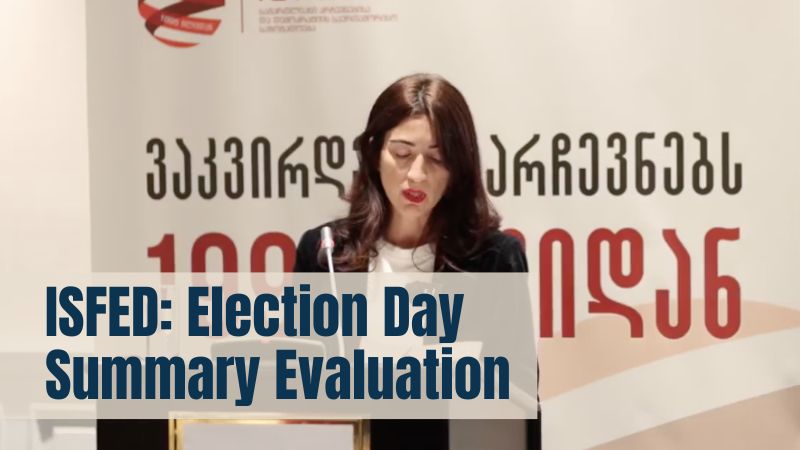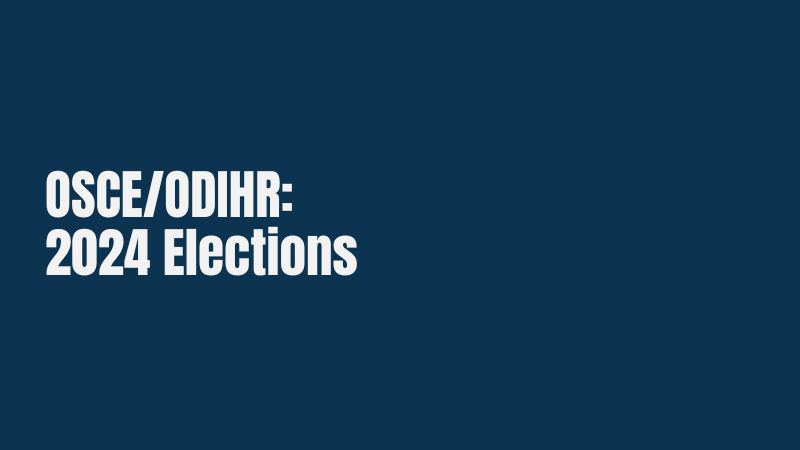On October 27, the day after the elections, the International Society for Fair Elections and Democracy (ISFED) presented a summary assessment of the pre-election period and Election Day observations during a briefing.
According to the organization’s assessment, pre-election pressure, intimidation, systemic collection of citizens’ identification documents, collection of personal data, and voter bribery significantly undermined trust in the elections.
The observation organization also reports severe violations on Election Day, pointing to ballot stuffing, multiple voting, unprecedented scale of voter bribery, expulsion of observers from polling stations, mobilized groups outside polling stations, collection of personal data, and instances of voter will control. ISFED assesses that the totality of violations could have had a substantial impact on the election results.
The organization also maintains that the pre-election period and Election Day should be evaluated collectively and summarizes the main findings of pre-election observation:
- Ruling party’s advantage in access to state resources, multiple electorally motivated social and budgetary programs, and participation of public institution employees in campaigning for the ruling party’s benefit;
- Negative impact of personal data collection, which the organization considers as pressure and interference with voters’ expression of will;
- The organization also references an article published by Batumelebi, revealing how Georgian Dream compiles “dossiers” using illegally obtained personal data;
- The organization cites a study published in July 2022 describing a large-scale scheme of voter bribery and pressure, noting the lack of response from investigative authorities, which, according to the organization, exacerbated the problem;
- Negative impact of legislative changes – including deterioration of CEC (Central Election Commission) composition rules, lowering decision-making threshold from qualified majority to simple majority in the CEC, along with other legislative issues;
- The organization also points to problems with electoral rights realization for citizens living abroad, noting that despite high demand, the opening of additional polling stations was insufficient, and mentions multiple cases of restricted voting rights on Election Day.
ISFED also summarizes Election Day observation results. The organization observed the voting through Parallel Vote Tabulation (PVT) methodology. Based on quantitative research, the organization explains that numerous violations were observed on the Election Day:
- Suspected voter bribery outside 13% of polling stations;
- 9% of polling stations failed to maintain voter secrecy;
- 9% of polling stations had problems with voter marking;
- Voter registration outside 31% of polling stations;
- Verbal and physical confrontations and threats at 11% of polling stations;
- Voter mobilization and transportation at 19% of polling stations.
The organization assesses that the number of certain types of violations significantly exceeds similar incidents from previous elections. Based on collected information, the organization filed over 200 complaints, 1 complaint to the CEC, and up to 70 remarks in the record books. Over 100 incidents were recorded outside polling stations and 170 incidents inside polling stations.
ISFED observed both the pre-election period and Election Day. The organization plans to continue monitoring election disputes and publish a final assessment incorporating information from the pre-election, Election Day, and post-election periods. The organization’s observation mission included 1500 observers (both in Georgia and at polling stations abroad) and consisted of precinct observers, district observers, and mobile groups.







